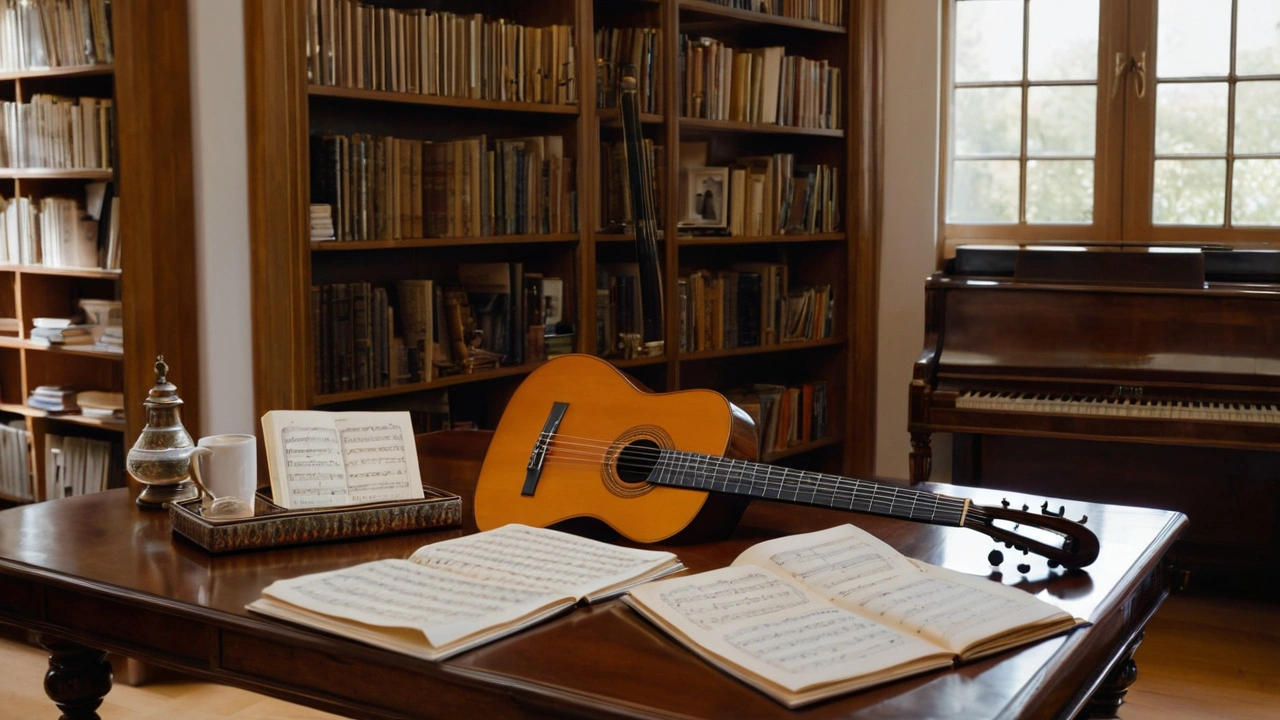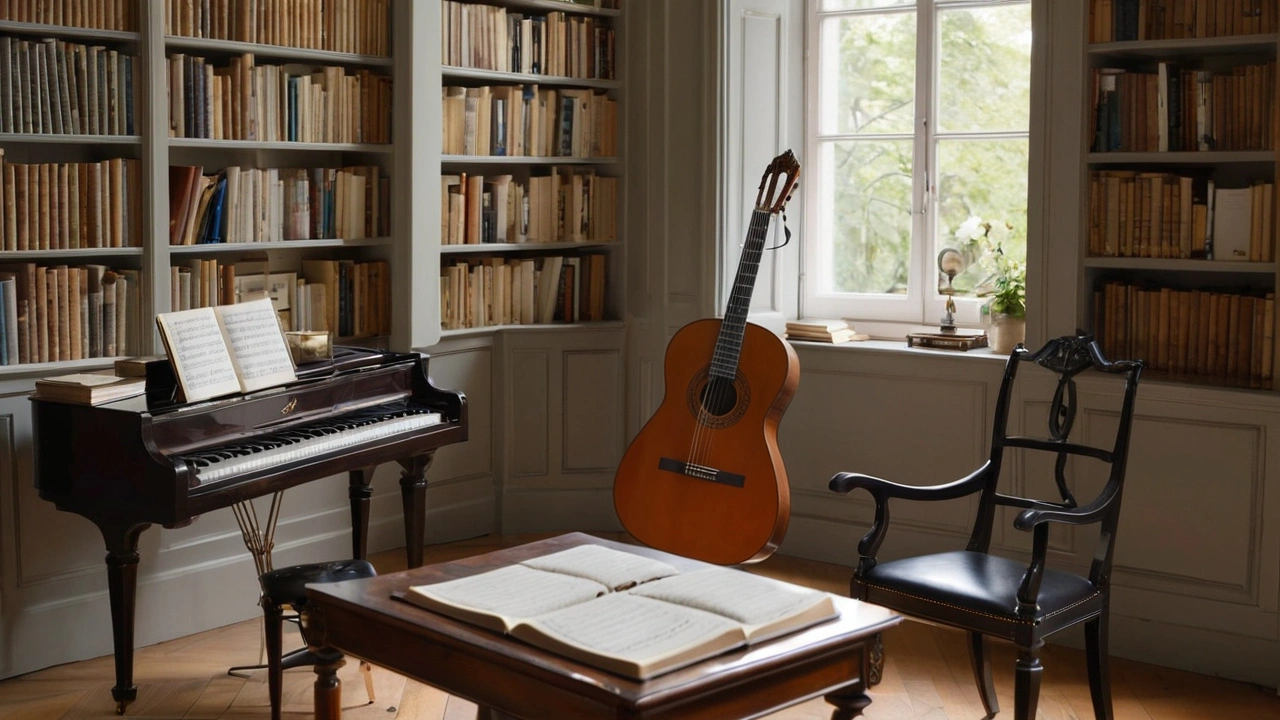Imagine strolling through a bustling office where professionals remain undisturbed by the surrounding chaos. The air is filled with the soothing strains of a Mozart piano concerto, creating a serene and focused atmosphere. What is it about classical music that can turn a frenetic workspace into a hub of productivity and creativity?
Classical music, with its intricate structures and harmonious melodies, has been proven to affect the brain in ways that enhance mental clarity and emotional stability. But how exactly does it work? And can it truly pave the way to success in both personal and professional spheres?
In this article, we'll explore the remarkable ways classical music can boost brain function, increase productivity, stimulate creativity, and even lead to personal breakthroughs. You'll find practical tips on seamlessly integrating classical compositions into your daily routine, along with inspiring stories from individuals who have unlocked their potential by embracing the classical music lifestyle.
Join us on a journey through the powerful symphony of classical music and discover how it can be your secret ingredient for success.
- The Impact of Classical Music on the Brain
- Classical Music for Increased Productivity
- Enhancing Creativity and Focus
- Practical Tips to Incorporate Classical Music
- Personal Stories and Success Cases
The Impact of Classical Music on the Brain
Classical music has fascinated scientists and physicians for ages, largely due to its profound effects on the human brain. By understanding these effects, we can harness the potential of classical compositions to boost our mental capabilities. So, what exactly happens when we immerse ourselves in the symphonies of Beethoven, Bach, or Mozart?
The brain, an incredibly complex organ, reacts uniquely to different stimuli. When it comes to **classical music**, numerous studies have revealed that listening can enhance cognitive functions, improve memory, and stimulate neural pathways. This phenomenon, often referred to as the 'Mozart Effect,' suggests that listening to Mozart's music can temporarily boost spatial-temporal reasoning skills.
According to Dr. Gordon Shaw, a physicist at the University of California, Irvine, "The Mozart Effect refers to the enhancement of brain development that happens when listening to classical music due to the highly organized structures in compositions".
These intricate patterns in **classical compositions** help in activating various parts of the brain simultaneously. For example, the auditory cortex processes the sounds, while the limbic system regulates emotions evoked by the music. This integrated activation can lead to improved focus, increased problem-solving abilities, and heightened creativity.
Moreover, classical music can have a calming impact on the brain, reducing stress and anxiety levels. The slow tempos and harmonious nature of many classical pieces can lead to the release of dopamine, a neurotransmitter associated with pleasure and reward. This results in a more relaxed and positive state of mind, which can be particularly beneficial in high-pressure environments like work or study.
To illustrate, a study conducted by Stanford University showed that participants who listened to classical music exhibited better synchronization between different brain regions, which is vital for effective communication and complex thought processes. These findings highlight the potential **benefits of incorporating classical music** into our daily routines, especially when engaging in tasks that require concentration and mental endurance.
Another interesting aspect is the way classical music impacts neuroplasticity—the brain's ability to reorganize itself by forming new neural connections. Listening to classical music has been shown to enhance this process, thereby improving learning abilities and memory retention. This is particularly significant for students or individuals in intellectually demanding professions.
Lastly, classical music's impact isn't limited to cognitive functions alone; it also influences our emotional well-being. The rich, emotional content of classical pieces can evoke deep feelings, providing an emotional outlet and fostering a sense of connection and empathy. This can be an effective way to manage emotions and cultivate a more balanced mental state.
In summary, the **impact of classical music on the brain** is multifaceted, influencing cognitive functions, emotional health, and overall mental well-being. By embracing classical music, we can tap into its powerful effects, enhancing our productivity, creativity, and emotional resilience.
Classical Music for Increased Productivity
When it comes to boosting productivity, classical music offers some intriguing advantages. Studies have shown that certain types of classical music can create an environment that enhances focus and efficiency. An example of this is the 'Mozart Effect', a theory suggesting that listening to Mozart's compositions can temporarily enhance cognitive function.
This isn't just a myth. Research by the University of California-Irvine found that students who listened to Mozart's sonata for 10 minutes before an IQ test scored higher than those who didn't. This demonstrates that classical music can prime the brain for enhanced performance, making it an ideal background for work that requires deep thinking and concentration.
Another interesting aspect is the role of classical music in reducing stress and anxiety, which are common productivity killers. Researchers from the University of Maryland Medical Center noted that listening to classical music can lower blood pressure, slow the heart rate, and reduce levels of stress hormones. This creates a state of calm that is conducive to sustained focus and efficiency.
Moreover, classical music helps in blocking out distracting noises. These distractions can often derail a productive work session, leading to lost time and diminished output. Through its complex structures and soothing qualities, classical music can mask background noise, allowing you to maintain your rhythm and momentum throughout the day.
Not all classical music works the same way, though. Pieces with a slow tempo and soft dynamics, like Debussy’s 'Clair de Lune' or Satie’s 'Gymnopédies', are excellent for tasks that require concentration, as they don't have sudden changes that might break your focus. On the other hand, faster, more dynamic pieces by composers like Vivaldi can be invigorating, perfect for when you need an energy boost.
Even giant corporations have recognized the benefits. It’s no secret that Google’s open office spaces occasionally feature background classical music to foster a productive and harmonious environment. This isn’t a mere trend but a scientifically-backed strategy to enhance employee performance.
So, how can you incorporate classical music into your routine for maximum productivity? First, curate a playlist that matches the nature of your tasks. Secondly, make use of streaming services like Spotify or Apple Music, which offer pre-made classical playlists designed to enhance focus and efficiency. Consider investing in good quality headphones to drown out distractions and fully immerse yourself in the music.
"Music is a moral law. It gives soul to the universe, wings to the mind, flight to the imagination, and charm and gaiety to life and to everything." – Plato
Finally, remember to experiment and see what works best for you. Productivity is a personal journey, and what enhances your focus might be different from someone else. Start with short periods and gradually increase the time you spend working with classical music in the background. Track your productivity levels and adjust as necessary, creating a personalized blueprint that incorporates the elegance and power of classical music into your daily life.

Enhancing Creativity and Focus
Picture this: you're at your desk, feeling the weight of a mental block. Ideas seem elusive, and your concentration flutters from one half-formed thought to another. Before you resign yourself to frustration, try reaching for your headphones and cue up some Bach. What happens next might surprise you.
Classical music has a unique ability to improve mental faculties. Studies show that listening to classical compositions can boost both creativity and focus. This phenomenon is often referred to as the 'Mozart Effect,' a term coined after research revealed that participants who listened to Mozart showed an increase in spatial-temporal reasoning skills. Essentially, classical music can serve as a brain-boosting tool, enhancing the way we process information and think creatively.
Neuroscientists have explored how different types of music affect the brain. It turns out that the structured complexity of classical pieces stimulates the brain's problem-solving areas. This is similar to how exercise benefits the body. Listening to classical music activates the production of dopamine, a neurotransmitter associated with pleasure and reward. As dopamine levels rise, so does your motivation and your capacity to tackle complex tasks.
But classical music does more than enhance focus; it can also foster creativity. A study published in the journal SAGE Open found that listening to happy music, including certain classical pieces, can promote divergent thinking—a key component of creativity. Divergent thinking enables brainstorming a variety of solutions to a problem, essential for innovative ideas. What’s intriguing is how our brain responds to these harmonious notes, enabling us to make novel connections and think outside the box.
“Music, in performance, is a type of sculpture. The air in the performance is sculpted into something.” — Frank ZappaWhere do you start if you want to harness this power? Begin with some of the classics. Pieces like Vivaldi’s Four Seasons or Beethoven’s Symphony No. 6 can provide a balanced mix of stimulating and relaxing effects. Find a quiet place, minimize distractions, and let the music take over. It's no coincidence that many renowned creatives, from Albert Einstein to Steve Jobs, incorporated music into their daily lives.
For a structured approach, consider these practical tips:
- Match the music to your task: For brainstorming sessions, choose uplifting pieces like Vivaldi’s Spring. For concentrated work, opt for something slower and more methodical, like Chopin’s nocturnes.
- Set a musical timer: Use a piece of music as a way to structure your work periods. For example, work through a movement of a symphony and take a break when it ends.
- Keep it instrumental: Lyrics can be distracting. Stick to purely instrumental classical music to maintain focus.
By integrating classical music into your routine, you can not only enhance your focus and creativity but also turn everyday tasks into more enjoyable experiences. The secret ingredient is already at your fingertips—or rather, your ears. Embrace it and watch your productivity soar.
Practical Tips to Incorporate Classical Music
Classical music can be a fantastic addition to many aspects of your daily life. Whether to enhance your focus, elevate your mood, or foster a peaceful environment, incorporating classical compositions can be straightforward and beneficial. So, how do you seamlessly integrate these timeless works into your routine?
Start by identifying moments in your day when music could be beneficial. Mornings can be an excellent time to engage with uplifting and intricate pieces. Mendelssohn’s “Italian Symphony” or Vivaldi’s

Personal Stories and Success Cases
Classical music does not just have theoretical benefits; real-life success stories abound, providing compelling evidence for its impact. Let's delve into some examples of individuals who have found its influence pivotal in their journey towards success.
Steve Jobs, the co-founder of Apple, was known for his love of classical music. It is said that Beethoven’s works often filled the air at Apple headquarters, helping to fuel Jobs’s creative genius. His deep appreciation for the music's complexity and beauty translated into innovative designs and revolutionary products. One story goes that during the development of the original Macintosh, Jobs would play Bach’s Brandenburg Concertos to inspire his team, emphasizing the importance of harmony and precision in their work.
A study conducted by the University of Helsinki found that listening to classical music enhances gene activity related to brain functions. This study is often cited by academics who use classical music to improve focus during intense study sessions. Harvard University professor Ellen Winner has mentioned how many of her colleagues use classical music as a tool to maintain concentration and creativity.
“It’s fascinating how Bach or Mozart can create a sound environment that allows my mind to flow freely,” says Dr. Jonathan Levitin, a neuroscientist who credits classical music for aiding his research breakthroughs.
The influence of classical music extends beyond the professional realm. Take the example of Meryl Streep, one of Hollywood’s most acclaimed actors. During the filming of “The Iron Lady,” where she played Margaret Thatcher, Streep often listened to classical pieces to get into character. The emotional depth and nuanced expressions in the music helped her deliver an Academy Award-winning performance.
In education, teachers have also leveraged the calming effects of classical music. Jeanine Manchester, a primary school teacher in Sydney, shared her experience of using Vivaldi’s “Four Seasons” during class activities. She noticed that students became noticeably more focused and less disruptive, ultimately improving their overall academic performance. Manchester stated, “Classical music has this amazing ability to create a peaceful atmosphere, allowing students to focus better and reduce tension.”
In the corporate world, the integration of classical music extends beyond individual workspaces. Many progressive companies have started incorporating it into their wellness programs. For instance, the multinational consulting firm Accenture has introduced 'Classical Music Breaks' where employees can take ten-minute breaks to listen to soothing classical pieces, which has reportedly increased overall job satisfaction and reduced stress levels.
These stories paint a vivid picture of how classical music can be more than just background noise. It can become a catalyst for creativity, productivity, and emotional well-being. Whether you are a tech mogul, an academic, an actor, an educator, or a corporate worker, its harmonious notes can indeed unlock a path to success.






